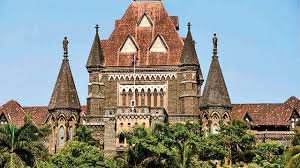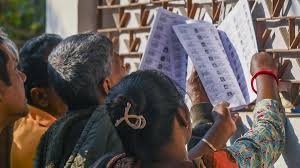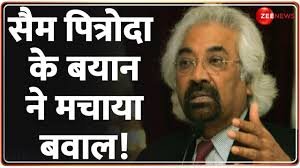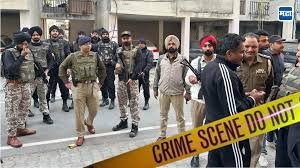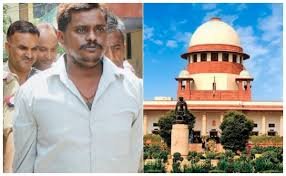
New twist in Nithari massacre; Supreme Court acquits Surendra Koli in all cases
Noida, November 11, 2025: In a shocking verdict, India's judiciary has received a shock verdict as the Supreme Court has acquitted Surendra Koli, the main accused in the Nithari massacre case, in the last pending case. The verdict was given by the court on Tuesday, bringing a new twist to the horrific case. The Nithari massacre, which began with the mysterious disappearance of children and young women in Nithari village in Noida, Uttar Pradesh between 2005-2006, remains a dark memory in the minds of the society. More than 16 murders were suspected in the case, including the frightening allegation of cannibalism. However, now that Koli has been acquitted in all cases, there is discontent among the victims' families and questions about the process of justice.
The background to the Nithari massacre is that in December 2006, human bones and skulls were found in a pit dug by dogs in the back of a bungalow near the NSS campus in D-5, Noida. The house belonged to Moninder Singh Pandher, a wealthy industrialist. His house servant Surendra Koli was suspected of being the mastermind behind the murders. Investigation revealed that Koli lured children and young women to his house and brutally murdered them. The case became a national hotbed of controversy due to allegations that some of the victims' organs were being sold and then eaten. Pandher was also accused of being involved, although he always maintained his innocence. The investigation process was extremely complex. The CBI took charge of the case and filed several charge sheets. Surendra Koli was initially convicted in several cases and sentenced to death. For example, he was sentenced to death in 2009 in the murder of a girl named Payal. Moninder Singh Pandher was also convicted in some cases, but most of them were overturned in the appeal process. However, in several cases, both Koli and Pandher were acquitted over lack of evidence. The Supreme Court had earlier acquitted Pandher in two cases in 2017, while in KoliΓÇÖs cases, it had stated that the evidence was insufficient.
In this last pending case, which involved the murder of a 6-year-old girl, the Supreme Court made it clear that the prosecution had not proved the case beyond reasonable doubt. The judge also noted that there were inconsistencies in the statements of witnesses and that direct evidence could not be linked to Koli. ΓÇ£The evidence should not be based on mere suspicion, it should be concrete and irrefutable,ΓÇ¥ the court said in its ruling. The decision will see Koli get immediate bail and be released from jail, even if other appeals are pending.
The families of the victims have been angered and disappointed since the decision. "When will we get revenge for the murder of our daughters? What is this court doing? We have been waiting for justice for years," said the mother of a victim from Nithari village. Social activists and child rights organisations have also criticised the decision, pointing out flaws in the investigation process. "The Nithari case has shown how weak the law is in protecting poor and minor girls," said child rights activist Shabbir Ahmed. On the other hand, some legal experts have seen the decision as an example of the independence of the judiciary. "It is a constitutional right that no accused should be presumed guilty until proven innocent," they argued. The Nithari massacre was a major setback for India's criminal justice system. The case, which came to light in 2006, had also created a stir at the political level. The then Chief Minister Mulayam Singh Yadav's government was criticised and a CBI probe was demanded. Of the 16 suspected murders, only 10 cases reached the court, and most of them have now been acquitted. Both Koli and Pandher are currently in jail, but Koli's release seems possible after this decision. The appeal process is also underway in Pandher's case.
In the wake of this decision, the Uttar Pradesh government has not ruled out the possibility of re-investigation. "If new evidence is found, we will take action within the framework of the law," said a senior official. However, even after 19 years, the victim's families are left alone in their struggle to get justice. A sense of fear and insecurity persists among the residents of Nithari village, and the case is being taught as a lesson for child safety.
This decision of the Supreme Court is a new chapter in the history of the Nithari massacre. It is a symbol of the failure of the investigation system, which is being discussed. In future, such cases need stronger laws and use of technology, so that the innocent get justice and the guilty are punished. Social activists are appealing that the society should learn from this incident, while cherishing the memories of the Nithari victims.
Noida, November 11, 2025: In a shocking verdict, India's judiciary has received a shock verdict as the Supreme Court has acquitted Surendra Koli, the main accused in the Nithari massacre case, in the last pending case. The verdict was given by the court on Tuesday, bringing a new twist to the horrific case. The Nithari massacre, which began with the mysterious disappearance of children and young women in Nithari village in Noida, Uttar Pradesh between 2005-2006, remains a dark memory in the minds of the society. More than 16 murders were suspected in the case, including the frightening allegation of cannibalism. However, now that Koli has been acquitted in all cases, there is discontent among the victims' families and questions about the process of justice.
The background to the Nithari massacre is that in December 2006, human bones and skulls were found in a pit dug by dogs in the back of a bungalow near the NSS campus in D-5, Noida. The house belonged to Moninder Singh Pandher, a wealthy industrialist. His house servant Surendra Koli was suspected of being the mastermind behind the murders. Investigation revealed that Koli lured children and young women to his house and brutally murdered them. The case became a national hotbed of controversy due to allegations that some of the victims' organs were being sold and then eaten. Pandher was also accused of being involved, although he always maintained his innocence. The investigation process was extremely complex. The CBI took charge of the case and filed several charge sheets. Surendra Koli was initially convicted in several cases and sentenced to death. For example, he was sentenced to death in 2009 in the murder of a girl named Payal. Moninder Singh Pandher was also convicted in some cases, but most of them were overturned in the appeal process. However, in several cases, both Koli and Pandher were acquitted over lack of evidence. The Supreme Court had earlier acquitted Pandher in two cases in 2017, while in KoliΓÇÖs cases, it had stated that the evidence was insufficient.
In this last pending case, which involved the murder of a 6-year-old girl, the Supreme Court made it clear that the prosecution had not proved the case beyond reasonable doubt. The judge also noted that there were inconsistencies in the statements of witnesses and that direct evidence could not be linked to Koli. ΓÇ£The evidence should not be based on mere suspicion, it should be concrete and irrefutable,ΓÇ¥ the court said in its ruling. The decision will see Koli get immediate bail and be released from jail, even if other appeals are pending.
The families of the victims have been angered and disappointed since the decision. "When will we get revenge for the murder of our daughters? What is this court doing? We have been waiting for justice for years," said the mother of a victim from Nithari village. Social activists and child rights organisations have also criticised the decision, pointing out flaws in the investigation process. "The Nithari case has shown how weak the law is in protecting poor and minor girls," said child rights activist Shabbir Ahmed. On the other hand, some legal experts have seen the decision as an example of the independence of the judiciary. "It is a constitutional right that no accused should be presumed guilty until proven innocent," they argued. The Nithari massacre was a major setback for India's criminal justice system. The case, which came to light in 2006, had also created a stir at the political level. The then Chief Minister Mulayam Singh Yadav's government was criticised and a CBI probe was demanded. Of the 16 suspected murders, only 10 cases reached the court, and most of them have now been acquitted. Both Koli and Pandher are currently in jail, but Koli's release seems possible after this decision. The appeal process is also underway in Pandher's case.
In the wake of this decision, the Uttar Pradesh government has not ruled out the possibility of re-investigation. "If new evidence is found, we will take action within the framework of the law," said a senior official. However, even after 19 years, the victim's families are left alone in their struggle to get justice. A sense of fear and insecurity persists among the residents of Nithari village, and the case is being taught as a lesson for child safety.
This decision of the Supreme Court is a new chapter in the history of the Nithari massacre. It is a symbol of the failure of the investigation system, which is being discussed. In future, such cases need stronger laws and use of technology, so that the innocent get justice and the guilty are punished. Social activists are appealing that the society should learn from this incident, while cherishing the memories of the Nithari victims.
The background to the Nithari massacre is that in December 2006, human bones and skulls were found in a pit dug by dogs in the back of a bungalow near the NSS campus in D-5, Noida. The house belonged to Moninder Singh Pandher, a wealthy industrialist. His house servant Surendra Koli was suspected of being the mastermind behind the murders. Investigation revealed that Koli lured children and young women to his house and brutally murdered them. The case became a national hotbed of controversy due to allegations that some of the victims' organs were being sold and then eaten. Pandher was also accused of being involved, although he always maintained his innocence. The investigation process was extremely complex. The CBI took charge of the case and filed several charge sheets. Surendra Koli was initially convicted in several cases and sentenced to death. For example, he was sentenced to death in 2009 in the murder of a girl named Payal. Moninder Singh Pandher was also convicted in some cases, but most of them were overturned in the appeal process. However, in several cases, both Koli and Pandher were acquitted over lack of evidence. The Supreme Court had earlier acquitted Pandher in two cases in 2017, while in KoliΓÇÖs cases, it had stated that the evidence was insufficient.
In this last pending case, which involved the murder of a 6-year-old girl, the Supreme Court made it clear that the prosecution had not proved the case beyond reasonable doubt. The judge also noted that there were inconsistencies in the statements of witnesses and that direct evidence could not be linked to Koli. ΓÇ£The evidence should not be based on mere suspicion, it should be concrete and irrefutable,ΓÇ¥ the court said in its ruling. The decision will see Koli get immediate bail and be released from jail, even if other appeals are pending.
The families of the victims have been angered and disappointed since the decision. "When will we get revenge for the murder of our daughters? What is this court doing? We have been waiting for justice for years," said the mother of a victim from Nithari village. Social activists and child rights organisations have also criticised the decision, pointing out flaws in the investigation process. "The Nithari case has shown how weak the law is in protecting poor and minor girls," said child rights activist Shabbir Ahmed. On the other hand, some legal experts have seen the decision as an example of the independence of the judiciary. "It is a constitutional right that no accused should be presumed guilty until proven innocent," they argued. The Nithari massacre was a major setback for India's criminal justice system. The case, which came to light in 2006, had also created a stir at the political level. The then Chief Minister Mulayam Singh Yadav's government was criticised and a CBI probe was demanded. Of the 16 suspected murders, only 10 cases reached the court, and most of them have now been acquitted. Both Koli and Pandher are currently in jail, but Koli's release seems possible after this decision. The appeal process is also underway in Pandher's case.
In the wake of this decision, the Uttar Pradesh government has not ruled out the possibility of re-investigation. "If new evidence is found, we will take action within the framework of the law," said a senior official. However, even after 19 years, the victim's families are left alone in their struggle to get justice. A sense of fear and insecurity persists among the residents of Nithari village, and the case is being taught as a lesson for child safety.
This decision of the Supreme Court is a new chapter in the history of the Nithari massacre. It is a symbol of the failure of the investigation system, which is being discussed. In future, such cases need stronger laws and use of technology, so that the innocent get justice and the guilty are punished. Social activists are appealing that the society should learn from this incident, while cherishing the memories of the Nithari victims.

.jpg)






